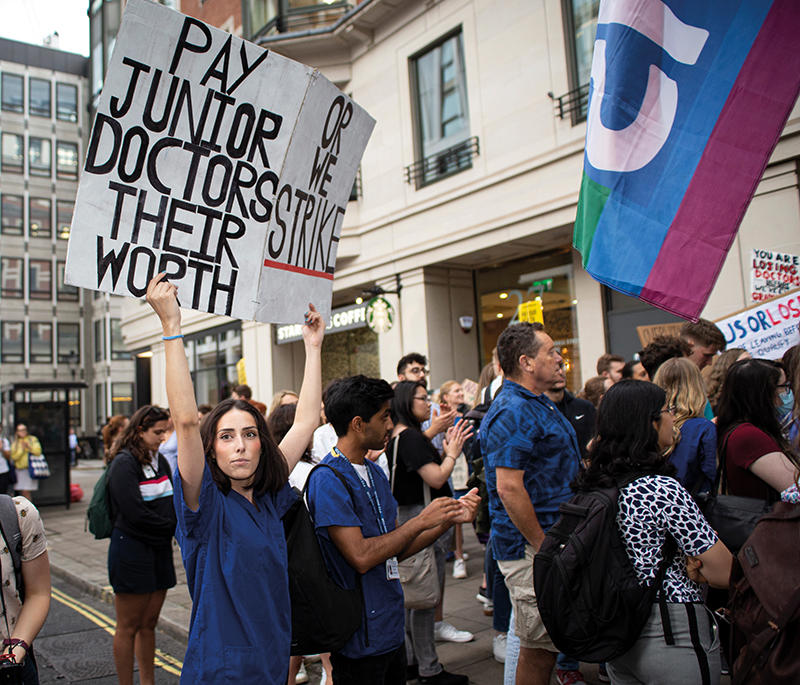‘There isn’t much incentive at the moment for IMGs (international medical graduates) to stay in the country,’ says Ayesha Shafaq. ‘But if pay is made better and visa restrictions are eased, many will stay.’
In her seven years as a UK resident, Dr Shafaq, a specialty trainee 3, has seen junior doctors’ pay erode and working conditions deteriorate.
Yet in 2020 and 2021 more than half of new doctors joining the GMC register completed their undergraduate medical degrees outside the UK or EEA (European Economic Area). And with more than 8,000 doctor vacancies in the NHS workforce (for secondary care alone), an exodus of IMGs could be disastrous.
Dr Shafaq, who is from Pakistan and completed medical school and her foundation year in Oman, points out that the reasons for settling overseas has historically put some IMGs off taking part in industrial action – including herself in 2016 – but that is starting to change.
‘Most of us are quite reluctant to even raise our voice, let alone vote for a strike,’ she tells The Doctor. ‘While I come from a relatively financially strong background, many IMGs come from financially humble backgrounds. Many of us have a lot of family commitments and when we come to the UK, we often leave our families behind.
‘We don’t just have responsibilities financially to take care of our families here in the UK, but a lot of us send contributions to extended families back home as well.’
Know your rights
Recently appointed as chair of the BMA West Midlands regional junior doctors committee, a member of the BMA West Midlands regional council and inequalities champion in the UK JDC executive sub-committee, Dr Shafaq feels obligated to ensure fellow IMGs understand their rights to take action and do not fear any potential repercussions.
Fear of losing visas is ‘by far the biggest reluctance’ IMGs have in terms of taking part in the industrial action, adds Dr Shafaq. ‘Most of us come on skilled-worker (formerly Tier 2) visas and the Home Office asks you to fulfil strict criteria before you can apply for indefinite leave for remain.
‘As foreigners in the UK, many of us will experience a culture shock when we first arrive and will take time to adjust. Many will be careful about not doing anything that may jeopardise their visa status. Striking for fair pay, therefore, will be least of our worries, unless a fellow IMG tells us its importance.’
She adds: ‘Most IMGs are unaware that they deserve more than what they are being paid right now. Many are not aware we’re being paid so much less than we were 14 years ago until a fellow IMG explains they’re probably working more and being paid so much less [in real terms] than in 2008.
‘Of course, it’s not just about money; the reason we became doctors is to help people. But you’re working hard to ensure the health of your fellow citizens so want some sort of remuneration, financial benefit. Clapping will not pay our bills.
‘Many of us, especially at registrar levels, have families to look after. Especially in this horrible economic environment, when inflation so high, we’re very scared of the future if there’s no change to our salaries. We’re not asking for a raise, only for our pay to be fully restored to what it was in 2008. That feels fair to ask for because of the pressure we’re under right now. People don’t understand the amount of work we do.
‘Work-life balance is out of the picture. We are contracted to work 9am-5pm, but many of us stay back to 6.30 to 7pm because of the amount of admin work we have. This further adds to the stress of an already overworked, underpaid doctor, who has added childcare responsibilities.
‘Doctors are not shy to work but, with such added working pressures and massive pay erosion, you feel like a kettle on a stove about to boil over.’
We hear horror stories of how many hours ambulances are waiting outside A&EDr Shafaq
Now a GP trainee in Stoke-on-Trent, Dr Shafaq spent time in London before settling in the Potteries. During her seven years in the UK, she has seen the workload of junior doctors ‘increase exponentially’ and ‘especially in A&E’, an area she worked in before beginning GP training.
‘The situation back in 2016-17 was certainly much more organised, less chaotic than now,’ she explains. ‘Daily we hear horror stories of how many hours ambulances are waiting outside A&E for vulnerable patients to be triaged. Many times these are critical patients, such as sepsis patients. That’s what the NHS has come to.’
Yet Dr Shafaq notes how ‘opportunities for world-class training and career progression remain a big draw for IMGs to come to the UK’.
She describes the NHS model as an ‘absolute blessing’ compared with other healthcare systems, but caveats that other countries such as Canada, Australia, New Zealand and some Middle Eastern countries such as the UAE and Qatar are now often more appealing than the UK to ‘brain drain’ IMG doctors coming from ‘economically unstable countries’ – because of working conditions and visa rules.
‘For some IMGs, the situation in UK is about the grass being greener,’ she explains. ‘It’s not always greener. Many realise that after they come here. In the last two or three years, IMGs have been more aware of the situation due to huge guidance they receive from senior NHS IMGs via social media support groups,’ she explains. ‘If I was applying to work in the UK in 2022, I know I would be much more aware of what I was getting myself into.’
Clear choice
And some, ‘particularly senior colleagues such as GPs, have already moved abroad’, she notes. ‘It’s basic maths. Let’s say you’re working the same hours, seeing the same amount of patients, but with less stresses – and in one country you’re getting £100 per hour, while in the other you’re getting £50 per hour. Where would you go?’
She points to the ‘huge amounts of financial and education investment’ put into IMGs who complete their training in the NHS, saying they should incentivise these doctors to stay here.
‘Why not create an environment where the doctor has no reason to leave?,’ she asks. ‘Many have set-up a life here with their families, built a social support circle, with their kids at school here. It’s very hard to leave that and start from scratch in a new place. But if the financial and visa situation does not improve, there might be no other choice. If we know we are being paid fairly many more would definitely stay.’
One ‘major’ way Dr Shafaq believes more IMGs would be encouraged to stay in the UK long-term would be removing the barriers imposed in 2012 on obtaining adult dependant relative visas.
‘Before 2012 ... you could obtain a visa for your parents or adult dependant relatives living back home. You’d pay for your parents to access the NHS, so they wouldn’t be a burden on the taxpayer – which is totally acceptable.
‘Thousands of IMGs go through a huge amount of mental stress thinking we can’t physically be there for our ageing parents or bring them here to take care of them in their time of need. IMGs are happy to support their parents financially. The Government should give them the chance.’
 Juniors protest about pay
Juniors protest about pay
Dr Shafaq explains how the Home Office ‘lays down clear criteria’ that skilled workers must fulfil to qualify for indefinite leave to remain, noting that ‘unauthorised leave from work impacts such decisions negatively’.
She adds: ‘Many IMGs think taking part in any industrial action would count as unauthorised or illegal leave. This is one of the reasons I didn’t get involved [in the junior doctor ballot] in 2016. At that stage, I didn’t understand these things and didn’t want to get into anything that might legally affect my status.
‘If I knew as little now as I did when I first started working in the NHS, I would be reluctant to be a part of any upcoming industrial action. The BMA has laid out very clear guidance about this on its website.’
You are afraid of being dismissed or being picked out as a trouble-makerDr Shafaq
Now Dr Shafaq is more confident in her rights, she insists: ‘It doesn’t matter if you are an IMG or a local graduate, it is absolutely your right to take part in legally organised industrial action, and this is a major reassurance to many IMGs.’
Dr Shafaq says ‘the narrative has changed’ among IMGs, who now have greater trade union representation within the BMA and have been sharing information with each other on social media – on wider working rights, not just the upcoming industrial action ballot.
‘Many of us come from backgrounds where seniority is to be respected at all times; from cultures where whistleblowing or ideas of structural reforms might not be openly welcomed and where, as a junior doctor, you are afraid of being dismissed or being picked out as a trouble-maker if you do so,’ Dr Shafaq explains.
‘So as an IMG, when you’re new to the system and still learning the NHS, you’re not used to a culture of challenging authority, which is why one of the biggest hurdles we’re experiencing in persuading IMGs to strike for full pay restoration is this fear of participation. However, as more and more IMGs take up leadership positions in the NHS, this mind set is changing.
‘I joined the BMA last year because I realised I had to do something about the workplace issues IMGs face, which include bullying and subtle racism. I wanted to better understand the NHS system.
‘Most of us come with the mindset that there are sacrifices we have to make. So, it’s sometimes easier to brush issues under the carpet, stay quiet and do your job.
‘But IMGs are becoming more and more aware of their rights. Not just about the poor pay we are getting now, they know they can come and speak to someone like me, who they can relate to. When I started in the NHS, if I saw a fellow IMG in a leadership position, I would always feel more comfortable knowing there is someone out there with a similar background who understands what I am going through.’
Dr Shafaq is glad to see such progress among the IMG community, not least because – as the growing numbers of IMGs in the country suggest: ‘If we want the pay restoration campaign to be successful, IMGs need to be fully involved in the process.’


